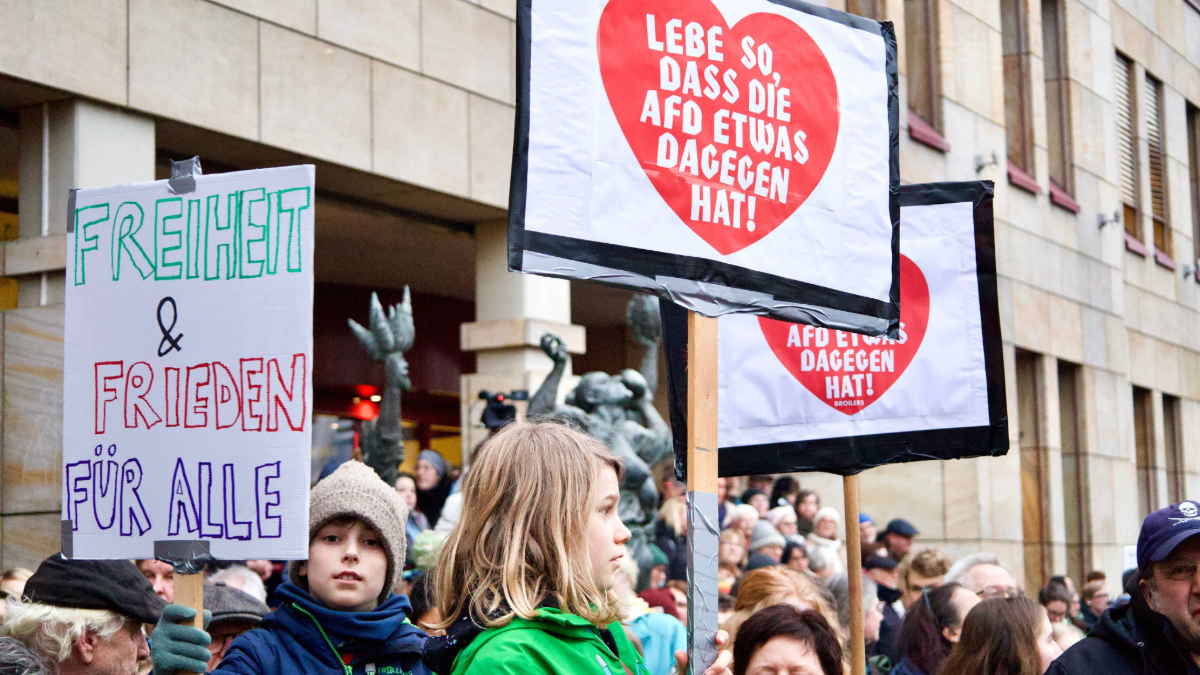Political Figures Must Be Held to the Same Online Standards as Others. It is Vital for Democracy and Human Rights.
Wendy Via, Heidi Beirich / Oct 9, 2024Wendy Via and Heidi Beirich are the cofounders of the Global Project Against Hate and Extremism.

January 30, 2024: Bad Kreuznach, Germany. Thousands of people demonstrated against hatred and AfD. Shutterstock
In this year of elections, hard-line authoritative figures in the US and across the globe, as well as racist, anti-LGBTQ+, and xenophobic political parties, continue to leverage social media to sow hate and misinformation. This grows their base, instills false fears in constituencies, radicalizes untold numbers into hateful and extremist ideas, and harms the democratic process. The social media companies’ policies state that public figures and politicians are subject to their content rules, but ‘public interest’ or ‘newsworthiness’ exemptions effectively render the rules useless. And where political ads are allowed, none are fact-checked, creating a tremendous source of disinformation.
Additionally, we have seen most companies reduce the size of content moderation and elections integrity teams. Unless significant and committed action is taken by the social media companies, democracies around the world and basic human rights and freedoms will continue to be at risk.
These risks are particularly acute in the Global South. Charlie Martial Ngounou, president of AfroLeadership, a PanAfrican rights group based in Cameroon, said of this year’s elections:
With what we have witnessed on digital platforms in recent elections in Africa and cognizant of the fact that more than 15 countries are on their way to this critical calendar point, where hate speech and tribalism are digitally exploited as electoral weapons with dramatic and dire consequences on communities, internet platforms and technology companies should imperatively allocate more resources to content oversight and moderation, with a special program for electorally motivated ads.
Far-right political figures and parties are often early adopters of technology, and social media platforms have been essential to the rise of far-right parties. For example, the far-right Alternative for Germany (AfD), a party designated as “suspected extremist” by its own government, and that just won major elections in multiple German states, along with its official youth party, Junge Alternative, designated a “confirmed right-wing extremist” group by the German government, all enjoy the use of the major social media platforms like Facebook, YouTube, and Twitter. There, content standards are enforced for regular users, yet unenforced for political figures and parties.
Social media and online platforms can be a positive or negative for democracy, and in recent years, including this year, we have witnessed firsthand the profound effect they have on elections and countries around the world. We have seen a weakening effect on struggling and strong democracies and an intensifying effect on authoritarian regimes. Overall, there is no doubt that the abuse of social media and social media platforms’ failures have had a negative impact on democracies worldwide.
It is specifically important that politicians and public figures not use social media to spread disinformation, hate speech, and other violent content. A body of research suggests the incendiary rhetoric of political leaders can make political violence more likely, incites violence and gives it direction, complicates the law enforcement response, and increases fear in vulnerable communities.
Hate speech has a measurable impact on people’s willingness and ability to participate in the democratic process. It can exert psychological constraints on members of a targeted group causing them to withdraw from public discourse, the so-called "silencing effect.” Moreover, hate speech causes desensitization, a loss of the ability to understand others’ pain, destroying a common basis for political communication and leading to the polarization that the US and so many other countries are currently experiencing.
As history continues to show, hate speech coupled with disinformation can lead to stigmatization, discrimination and large-scale violence. Hate speech has been identified as a precursor to atrocity crimes, including genocide. And violence against LGBTQ+ people reached its highest point in the past decade in Europe and Central Asia in 2022 and the US against the backdrop of “rising and widespread hate speech from politicians, religious leaders, right-wing organizations and media pundits.” Hate speech from politicians and state officials was reported in 23 countries across Europe, as well as Azerbaijan.
As UN Secretary-General António Guterres has said, “Addressing hate speech does not mean limiting or prohibiting freedom of speech. It means keeping hate speech from escalating into something more dangerous, particularly incitement to discrimination, hostility, and violence.”
Political leaders’ remarks do not disappear on social media, especially as the social media platforms’ algorithms are designed to amplify more incendiary remarks, quickly magnifying rhetoric against their political opponents, minority groups, and other targets. Leaders with large social media followings will see their remarks shared with millions of followers. This then drives coverage in more traditional news outlets and serves as a cue to local politicians whose similar content is in turn amplified by their communities and by company algorithms. Globally, public and political figures use social media marketing tools for campaigns, not only because it is effective, but they are also able to bypass rules and norms of traditional media. And for those who wish to engage in hate and demonizing speech, the results can be a matter of life and death.
One of the most important commitments that social media companies can make is to apply their own content rules and community standards to political figures as other users, especially hate speech and incitement to violence rules. This should be done without regard to political position or economic considerations and in all languages and regions of the world. Most content moderation today is driven by automated systems primarily trained in English.
As the Global Alliance Against Digital Hate and Extremism, composed of more than 70 human rights organizations from around the world, said in a letter to major tech and social media companies:
There is much that we as human rights and democracy advocates would have your companies do to protect the humans in this world, our elections, and our global democracies. But today, we are insisting that you enforce your already existing policies fairly and equitably to protect democracy and marginalized communities globally. You can do this by committing to eliminating your exemptions for public and political figures and guaranteeing that human moderators, well-trained in your rules, with cultural and language competency, review posts from public and political figures and guaranteeing that human moderators, well-trained in your rules, with cultural and language competency, review posts from public figures and politicians.
The esteemed Club de Madrid, a coalition of more than 100 democratic former heads of state, has also written to the social media and tech companies expressing profound concern over the proliferation of online hate speech and its detrimental impact on democratic values worldwide.
Carlos Alvarado, a Member of Club de Madrid and former president of Costa Rica, highlighted, “Leaders’ rhetoric on social media has real-world consequences, amplifying division and fear. As democratic former presidents and prime ministers, we are firmly committed to safeguarding democracy in the digital age, one keystroke at a time.”
And Danilo Türk, President of Club de Madrid and former president of Slovenia, said, “We bear witness to the erosion of democratic values in the digital era, and are urging urgent action. Hate speech online silences voices, desensitizes societies, and undermines the very fabric of democracy, emboldening authoritarians.”
More countries have moved away from democracy rather than toward it, particularly over the last several years, including in countries where democracy was thought to be firmly established. And since 2017, the number of countries moving toward authoritarianism are more than double those that are moving toward democracy. Violence linked to far-right political figures’ use of social media is not a matter of opinion. Experts routinely highlight the power of political figures to incite violence against their perceived enemies and research has found that allegations of mass voter fraud strongly undermine trust in elections, the bedrock of a healthy democracy, and the acceptance of election results.
Given the equally unprecedented potential influence of social media platforms and those adept at manipulating the platforms, and the additional concerns emerging as a result of the expansion of AI and its unknown effects, it is vital that the platforms do all they can to protect democracies and elections around the world, not just this year, but for the future, especially given the precarious state of some democracies. A tremendous step toward protecting voters and democracy would be to finally fully enforce the community standards for the politically powerful.
Authors

